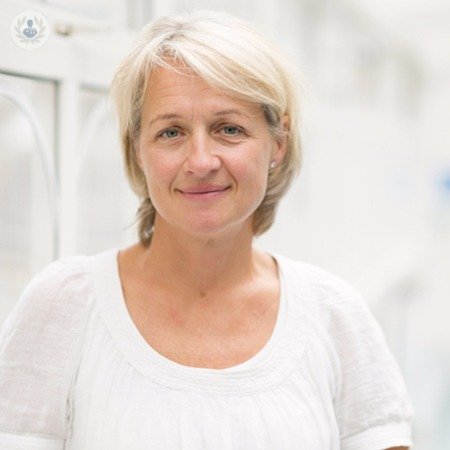
Professor Claire Hogg (pictured, right), paediatric respiratory consultant, has been awarded funding by National Institute for Health Research (NIHR) for a study which aims to train artificial intelligence to be able to diagnose primary ciliary dyskinesia (PCD), a rare, genetic, long-term condition that children are born with.
In healthy airways, cells are lined with 'hair-like' cilia that sweep in a coordinated way to clear mucus, bacteria and debris from the airway. In PCD, problems with the movement of the cilia result in the build-up of mucus that can lead to recurring infections and damage to the lungs. Early diagnosis is important to help prevent lung damage in childhood and to keep the lungs working as possible.
Around 1 in 10,000 people have PCD in the UK, with the Trust treating over 300 patients a year.
Diagnosis of the disease is complex and currently relies on looking at cilia with a powerful electron microscope. But even with microscopy images experts can have differing opinions on what they show.
The aim of Professor Hogg’s study is to use artificial intelligence computing techniques to identify both healthy and abnormal cilia from electron microscopy images in order to provide a faster, more accurate and reliable approach to evaluate ciliary structure.
Artificial intelligence is increasingly used in medicine and self-learning systems have already been trained to recognise a range of medical conditions.
Professor Hogg and her team hope to be among the first in the world to use a new interactive artificial intelligence technology, known as Intel GETi®, that allows clinical experts to train the self-learning systems, in real-time. In doing so, they will use their knowledge, intuition and expertise to guide the learning process.
If successful, such technology could revolutionise diagnosis and medical research.
"Machine learning lends itself to improving the accuracy and turnaround times for patients undergoing testing using electron microscopy for this rare disease. Success in this field may pave the way for other rare diseases where time-consuming and expensive diagnostic pathways often lead to delays in starting treatments,"said Professor Hogg when receiving the award.
The study is funded under the NIHR's Invention for Innovation (i4i) award, which aims to cultivate new techniques or technologies into innovative interventions in the NHS through collaboration with small- and medium-sized enterprises (SME’s).
Find out more about this study and our other research.
